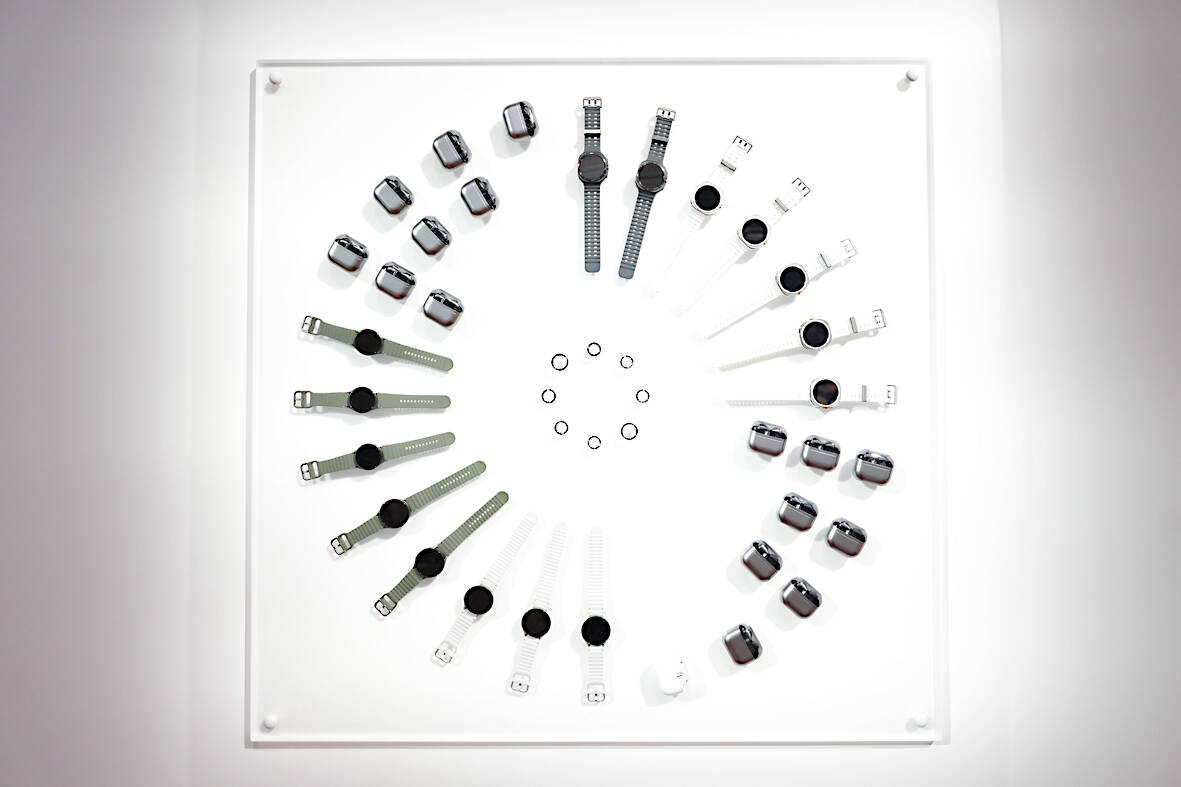Smartwatches could be used to help people quit smoking, a study suggests.
Researchers have developed pioneering motion sensor software that can detect the typical hand movements that occur when someone is holding a cigarette.
When cigarette use is detected, an alert flashes up on the smartwatch screen. An app on the device delivers a vibration with a text message designed by smokers and former smokers, offering support to stop smoking.

Photo: Bloomberg
One message reads “Stopping smoking lets you breathe more easily … Quitting is good,” while others contain a tally of how many cigarettes were smoked and the total number of drags taken that day.
The researchers, from the University of Bristol, believe their app is the first just-in-time intervention for preventing smoking relapse that runs entirely on a smartwatch and does not need to be paired with a smartphone.
Chris Stone, of the University of Bristol’s tobacco and alcohol research group, said an initial lapse was a vulnerable moment for people trying to quit, and risked leading to a full relapse to smoking.
“People like smartwatches. They like the idea of it delivering a message at the point that they smoke,” he said. “Therefore, if we can identify this point of lapse, and deliver an intervention precisely at that point, we have an opportunity to improve the success of the quit attempt.”
Stone added: “We have aimed to harness the latest thinking in intervention design, and deliver it in a convenient wearable package with minimal burden to the user and maximum engagement with behaviour change; and in doing so, make a difference to people’s lives.”
In the study, published in the journal JMIR Formative Research, the smartwatch app was tested on 18 people interested in quitting smoking. The participants were aged between 18 and 70, and smoked more than 10 cigarettes a day with their right hand.
They wore a TicWatch loaded with the app for two weeks, before completing a questionnaire consisting of 27 questions.
In total, 66 percent of participants said it was acceptable to wear the smartwatch with the motion sensor software, while 61 percent said the content of messages was relevant to them.
Positive feedback included people reporting that the app raised awareness of smoking, made them feel positive about quitting, made them stop and think, helped them smoke less and provided constant encouragement.
However, negative responses were that repeated messages lost their effectiveness, some messages did not appear quickly enough, there was not enough variety of messages and some were too vague.
The next step is a longer-term effectiveness trial, which could use a greater variety of messages, the researchers said.
Alizee Froguel, prevention policy manager at Cancer Research UK, said that the study shows that smartwatches could be a useful method to help people quit smoking, but more research is needed to understand how effective they are.
“There are many tools available to help people quit, and getting support from your free local stop smoking service will give you the best chance of stopping successfully,” she said.

Taiwan has next to no political engagement in Myanmar, either with the ruling military junta nor the dozens of armed groups who’ve in the last five years taken over around two-thirds of the nation’s territory in a sprawling, patchwork civil war. But early last month, the leader of one relatively minor Burmese revolutionary faction, General Nerdah Bomya, who is also an alleged war criminal, made a low key visit to Taipei, where he met with a member of President William Lai’s (賴清德) staff, a retired Taiwanese military official and several academics. “I feel like Taiwan is a good example of

March 2 to March 8 Gunfire rang out along the shore of the frontline island of Lieyu (烈嶼) on a foggy afternoon on March 7, 1987. By the time it was over, about 20 unarmed Vietnamese refugees — men, women, elderly and children — were dead. They were hastily buried, followed by decades of silence. Months later, opposition politicians and journalists tried to uncover what had happened, but conflicting accounts only deepened the confusion. One version suggested that government troops had mistakenly killed their own operatives attempting to return home from Vietnam. The military maintained that the

Taipei Mayor Chiang Wan-an (蔣萬安) announced last week a city policy to get businesses to reduce working hours to seven hours per day for employees with children 12 and under at home. The city promised to subsidize 80 percent of the employees’ wage loss. Taipei can do this, since the Celestial Dragon Kingdom (天龍國), as it is sardonically known to the denizens of Taiwan’s less fortunate regions, has an outsize grip on the government budget. Like most subsidies, this will likely have little effect on Taiwan’s catastrophic birth rates, though it may be a relief to the shrinking number of

Since its formation almost 15 years ago, Kaohsiung rock band Elephant Gym (大象體操) has shattered every assumption about contemporary popular music, and their story is now on screen in a documentary titled More Real Than Dreams. It’s an unlikely success story that says a lot about young people in Taiwan — and beyond. For a start, their sound is analog. In the film, guitarist Tell Chang (張凱翔) proudly says: “There is no AI in our sound.” His sister, bass player KT Chang (張凱婷) is the true frontwoman — less for her singing abilities than for her thunderous sound on the instrument. Fast like